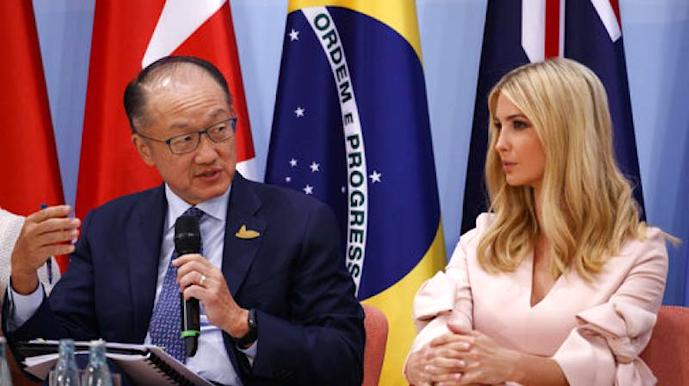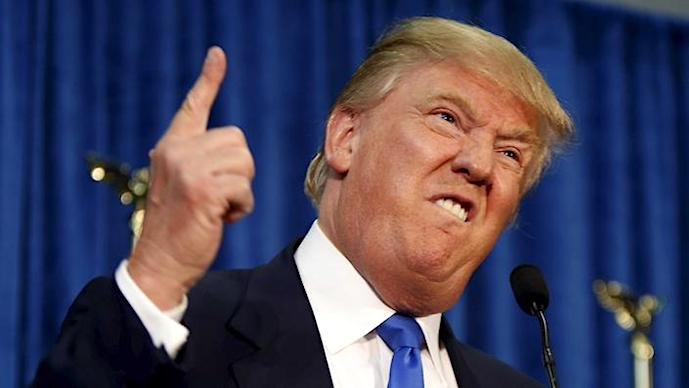
No, I don’t mean ‘hopping mad’. We
know that he is hopping mad with the media and its ‘fake news’, with CNN particularly, and with some of its commentators whom he has chosen to label as intellectually deficient, and unpleasant to the eyes (bleeding from a face lift!).
We
know he is hopping mad about the criticism he attracts. We
know he prefers admiration, adulation, even reverence. We
know he craves the hero worship he received as host and star in his TV reality show
The Apprentice. We
know he needs his image to be polished endlessly. Fame is almost more important to him than fortune.
No, I mean ‘mad’ in the clinical sense, in the sense of the many synonyms of the word: mentally disturbed, insane, lunatic, maniacal, even crazy or crazed. Some peri-clinical synonyms of ‘mad’ too might be applicable: unstable, erratic, unsafe, dangerous, perilous, foolish, senseless.
‘Mad’ derives in part from the Old English
‘gemædde’: ‘out of one’s mind’, ‘extremely stupid’, ‘insane’ or ‘foolish’.
Do you see a nexus between these words and Trump’s behaviour?
Let me present you with some evidence so that
you can make up your own mind about whether Donald John Trump, President of the United States of America is indeed ‘mad’.
First, look at a report in
The Guardian of what ABC political commentator Chris Uhlmann had to say at the conclusion of the recent G20 meeting in Hamburg. Do watch the video; it will become a collectors’ item.
Speaking on Sunday from the G20 conference in Hamburg, Uhlmann said Trump had shown ‘no desire and no capacity to lead the world’ and was himself ‘the biggest threat to the values of the west’.
He was an uneasy, lonely, awkward figure at this gathering and you got the strong sense that some of the leaders are trying to find the best way to work around him, Uhlmann said.
Where was the G20 statement condemning North Korea which would have put pressure on China and Russia? Other leaders expected it, they were prepared to back it, but it never came.
Uhlmann said Trump was obsessed with ‘burnishing his celebrity’ and had ‘diminished’ his own nation to the benefit of Russia and China.
We learned that Donald Trump has pressed fast-forward on the decline of the United States as a global leader. He managed to isolate his nation, to confuse and alienate his allies and to diminish America.
[He is] a man who barks out bile in 140 characters, who wastes his precious days as president at war with the west’s institutions like the judiciary, independent government agencies and the free press.
So astute was Uhlmann’s analysis that the video of it soon became viral, drawing complimentary remarks from observers of international politics.
Look at the essence of his analysis. Keep in mind that he is referring to the man who occupies the most powerful position in the world, a position that demands leadership in today’s complex global environment where everything is interconnected.
First, Uhlmann concludes that Trump has 'no desire and no capacity to lead the world'. The world’s media reaction to Uhlmann’s analysis was strongly affirmatory; clearly many agreed. How can a man in Trump’s position eschew leadership and show no capacity for it? Does this fit synonyms of ‘mad’ such as: ‘foolish’, ‘senseless’, ‘ill-advised’, or even ‘unsafe’, ‘dangerous’ or ‘perilous’?
Uhlmann concluded that Trump had 'managed to isolate his nation, to confuse and alienate his allies, and to diminish America.' He went onto say that this defect rendered Trump 'the biggest threat to the values of the west'. What words apply to this assertion? Mentally disturbed, even insane?
Writing in
news.com.au, in an article titled:
Radical new plan to remove ‘incapacitated’ President Trump, Liz Burke makes this assessment:
US politicians are so seriously concerned about President Donald Trump’s sanity they are making a plan that could see him removed from the White House over it.
A group of Democrats has put forward a bill to propose a committee that could declare Mr Trump ‘incapacitated’ and remove him from office.
The increasing level of concern over the deteriorating situation in the White House comes as questions have been raised over the President’s state of mind following a series of bizarre and even aggressive tweets.
Mr Trump at the weekend shared a violent video in which he was shown wrestling to the ground and repeatedly striking a man whose face was covered by a CNN logo. This followed a series of personal attacks on a female journalist, and railing against the MSNBC breakfast program she hosts.
In another tweet, the President conceded his use of social media was 'not presidential', but declared a new term for his style: ‘MODERN DAY PRESIDENTIAL’.
Others have declared it crazy, unusual, and concerning, and are making moves to use his unusual behaviour to end the celebrity businessman-turned-politician’s presidential term.
The evidence suggesting ‘madness’ accumulates.
David Renmick, editor of
The New Yorker in an article titled
American Dignity on the Fourth of July writes
inter alia:
Donald Trump...has no interest in the wholeness of reality. He descends from the lineage of the Know-Nothings, the doomsayers and the fabulists, the nativists and the hucksters.
The thematic shift from Obama to Trump has been from ‘lifting as we climb’ to ‘raising the drawbridge and bolting the door’. Trump may operate a twenty-first-century Twitter machine, but he is still a frontier-era drummer peddling snake oil, juniper tar, and Dr. Tabler’s Buckeye Pile Cure for profit from the back of a dusty wagon.
Further on Renmick writes:
Trump is hardly the first bad President in American history – he has not had adequate time to eclipse, in deed, the very worst – but when has any politician done so much, so quickly, to demean his office, his country, and even the language in which he attempts to speak?
Every day, Trump wakes up and erodes the dignity of the Presidency a little more. He tells a lie. He tells another. He trolls Arnold Schwarzenegger. He trolls the press, bellowing ‘enemy of the people’ and ‘fake news!’
He shoves aside a Balkan head of state. He summons his Cabinet members to have them swear fealty to his awesomeness. He leers at an Irish journalist.
Last Thursday, he tweeted at Joe Scarborough and Mika Brzezinski, of MSNBC: 'I heard poorly rated @Morning_Joe speaks badly of me (don’t watch anymore). Then how come low I.Q. Crazy Mika, along with Psycho Joe, came . . . to Mar-a-Lago 3 nights in a row around New Year’s Eve, and insisted on joining me. She was bleeding badly from a face-lift. I said no!'
The President’s misogyny and his indecency are well established. When is it time to question his mental stability?
Returning to the G20, what was Trump thinking when he delegated his 35 year old favourite daughter Ivanka to sit in for him among world leaders: Xi Jinping, Angela Merkel and Recep Tayyip Erdogan? Usually high-ranking public officials are delegated this task. Historian Anne Applebaum took to Twitter to denounce what she described 'an unelected, unqualified, unprepared New York socialite' being seen as 'the best person to represent American national interests'.

Trump defended his action with these words: 'I’m very proud of my daughter, Ivanka – always have been, from day one I have to tell you, from day one...She’s always been great. She’s a champion. If she weren’t my daughter, it would be so much easier for her. Might be the only bad thing she has going, if you want to know the truth.'
Ivanka was given the official title of 'First Daughter and Advisor to the President' early in the administration, amid outcry that an unofficial role exempted her from ethics rules.
Is this behaviour an example of an unbalanced person?
Read what another writer at
The New Yorker, Evan Osnos, had to say in an article written back in May:
Is political hubris an illness? He begins:
In February, 2009, the British medical journal Brain published an article on the intersection of health and politics titled Hubris Syndrome: An Acquired Personality Disorder? The authors were David Owen, the former British Foreign Secretary, who is also a physician and neuroscientist, and Jonathan Davidson, a professor of psychiatry and behavioral sciences at Duke University, who has studied the mental health of politicians. They proposed the creation of a psychiatric disorder for leaders who exhibited, among other qualities, 'impetuosity, a refusal to listen to or take advice, and a particular form of incompetence when impulsivity, recklessness and frequent inattention to detail predominate.'
Sound familiar? Do these words apply to Trump?
Further on Osnos uses these words:
President Donald Trump, in the months since he entered the White House, has become a kind of international case study of mental health’s role in politics. To his friends and allies, he elicits an array of anodyne, even appealing, adjectives: unpredictable, fearless, irascible, sly. Many of his counterparts in diplomacy, and in American politics, are rapidly shedding the euphemisms that they once used to express their appraisals, however.
When Trump, after a confused viewing of a Fox News segment, urged people at a rally 'to look at what’s happening last night in Sweden. Sweden, who would believe this?', suggesting that an incident – which no one could identify; nothing notable had happened the night before – had something to do with Sweden being overrun by refugees, Swedes reached a judgment. 'They thought the man had gone bananas', Carl Bildt, Sweden’s former Prime Minister and foreign minister, told Susan Glasser, of Politico, in an interview published this week. 'It was a somewhat unsettling thing to see the president of the United States without any factual basis whatsoever lunge out against a small country in the way that he did.'
Though politicians often accuse each other of being crazy, Trump has inspired a more clinical and sober discussion. (In the magazine this week, I write about proposals in Congress to assess the President’s mental health.) In recent days, the discussion of Trump’s stability has entered a blunter phase.
Over the weekend, Trump made a series of bizarre comments, including questioning the history of the Civil War, saying he was ‘looking at’ breaking up banks (prompting a stock-market slide), and demonstrating unfamiliarity with basics of the health-care bill known as Trumpcare. The Presidential historian Douglas Brinkley told an interviewer that it was 'among the most bizarre recent twenty-four hours in American Presidential history', adding, 'It was all just surreal disarray and a confused mental state from the President.' Joe Scarborough, the former Republican congressman, told his television audience, 'My mother’s had dementia for ten years…That sounds like the sort of thing my mother would say today.'
Finally let’s hear from our own
Julia Gillard, recently appointed head of
Beyond Blue, who cautions against throwing around the charge of being mentally ill as an insult. But she did weigh into Donald Trump’s odd Twitter behaviour, acknowledging there will be questions about his mental health, acknowledging that some had a genuine concern for the president: 'I know that some people in the US, some commentators are not proffering that analysis by way of insult, they’re actually saying it because they are genuinely concerned. But I do think if President Trump continues with some of the tweeting etcetera that we’ve seen, that this will be in the dialogue.'
Let’s end on that sober note before this piece becomes too long.
With the evidence and the opinions quoted above, what do you make of it all? Recall the words that are used to describe ‘madness’: mentally disturbed, insane, lunatic, maniacal, crazy, unstable, erratic, unsafe, dangerous, perilous, foolish, senseless, and impractical.
Ask yourself, does Donald John Trump, President of the United States of America, show signs of madness as described above?

Current rating: 0 / 5 | Rated 0 times